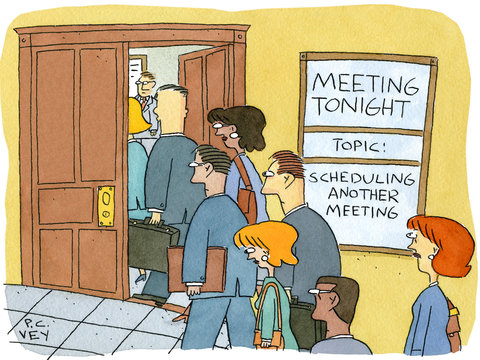I’m going to make an argument here (and probably do so poorly), and the argument is going to be a little bit hard to follow (I think). Bear with me. I think there might be something here.
- (Generalization to start) A lot of men love sports; that might be one of the main touch-points of Stuart Scott passing away.
- Men tend to be “business leaders” at a much higher rate than women, even though that makes no sense.
- Men often deify the idea of the intersection of “athletics” and “business” to the point that we have a concept called “The Corporate Athlete.”
- One of the biggest ways you spend your day as a business leader is in meetings, which are generally pretty ineffective.
- Meetings aren’t actually work; meetings are almost the prep for the work. You discuss stuff, theoretically get on the same page, and then different people have different deliverables. (That’s the ideal way it should work; it very infrequently actually works that way.)
Now we need to shift to a more semantic argument, which is where it might get confusing. Many people in the working world view meetings as “necessary evils,” and not as “training.” They view the concept of “training” (such as going to an off-site or lecture or having a coach come in) as “training.”
But in reality, if you want to extend this “Corporate Athlete” idea, meetings are like trainings. The game is the actual work and trying to achieve in what you produce.
So now stop and think back one step.
If you think of meetings as a training ground for work — when meetings work well, they better prepare you to do the work; when athletes train well, they’re better prepared to play in the games — then think about how athletes train.
Oftentimes, athletes will do things in training that don’t necessarily relate to the games directly. For example, a QB might workout and do shoulder presses. He very infrequently needs to make that motion, with weights, in a game — but the overall idea is to get stronger so that when certain situations arise in certain games, he can be ready. That same QB doesn’t just work on running and throwing and calling audibles. That’s a large portion of what he does, but it’s not everything.
It’s a mix, and not all of it always seems to directly relate to the idea of “Winning More Games.”
So …
Why do meetings always have to be about a specific topic or deliverable?
Couldn’t you gather a bunch of people for a meeting and discuss an idea like “fostering curiosity” or “how we work together?”
I realize what would probably happen if you tried to do this: people’s heads would explode (“What is this?”) or they’d instantly think it was bullshit (“I have real work to do!”). The human brain, and especially the human working brain, is very conditioned to “go to a meeting, sit there, say your requisite 2-3 things, get your deliverable, go to next meeting, etc.”
But maybe we could even break that chain by shifting up the whole idea of a meeting from time-to-time. So instead of coming together to discuss “this-or-that-rollout,” we come together and train our communication skills, our EQ skills, talk about failure, whatever.
That’s the same thing as LeBron James doing 25 sharp cuts in practice. He may go 10 straight games without making a sharp cut, but he still needs to train his body and work on that. We may go 10 quarters without needing EQ and communication skills (hardly, as you need the latter every day), but we still need to come together and work on it once in a while.
This might be the dumbest thing I’ve ever written, or the most visionary, or neither. If you have thoughts, message or leave it in the comments.
